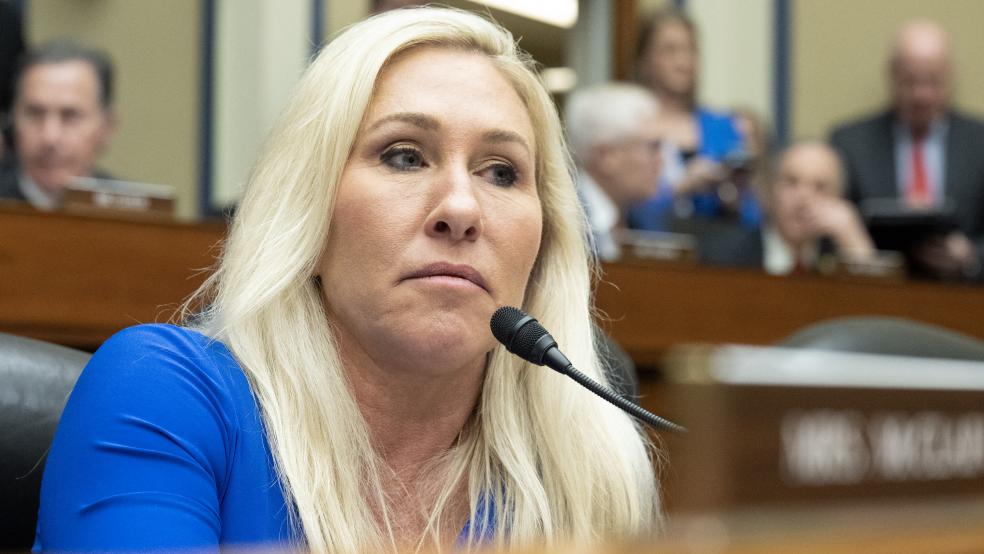The House on Friday narrowly passed a $1.2 trillion funding package that would avert a government shutdown at midnight, sending the legislation to the Senate with just hours to go before the deadline. The Senate is expected to pass the measure eventually, though Republican demands for amendment votes mean lawmakers may not be able to act in time to avoid a lapse in funding.
Johnson faces a revolt: The House’s bipartisan, 286-to-134 vote earlier in the day was a big step toward resolving months of congressional clashes over policy differences and spending levels, with the turmoil fueled in large part by internal GOP divisions. Those rifts erupted into full view again on Friday, as most House Republicans voted against the bill, which cleared the required two-thirds majority with just seven votes to spare. Democrats supplied 185 of the “Yes” votes, compared to 101 Republicans.
The six-bill spending package would fund nearly 75% of the government through September, following a separate package covering the rest of federal operations that was passed by Congress earlier this month. Conservatives blasted both the content of the spending package and the accelerated process by which it passed, and while the vote was happening an angry Rep. Marjorie Taylor Greene of Georgia filed a surprise motion to oust House Speaker Mike Johnson, who took over the leadership post just five months ago. Republicans picked Johnson after a group of hardliners cast Kevin McCarthy out of the job following a similar clash over spending.
Greene filed her motion in such a way that does not require a quick vote on Johnson’s fate. She told reporters that her move was “more of a warning and a pink slip” and that she did not want to throw the House into weeks of chaos like it saw after McCarthy was voted out. But she said that Republicans need to pick another speaker because Johnson had violated promises to return to regular order on spending bills and to allow members 72 hours to review legislation before voting on it. Johnson relied on Democratic votes to pass three earlier stopgap funding bills and the prior appropriations package.
“Speaker Johnson has betrayed our conference and broken our rules,” Greene said. “This bill was basically a dream and a wish list for Democrats and for the White House.”
The House left for a 16-day recess on Friday, and Greene did not say whether or when she might seek to bring her motion to a vote. She added that some fellow Republicans support her move, though others reportedly had urged her to hold off.
“If we vacated this speaker, we’d end up with a Democrat,” Rep. Matt Gaetz, who led the revolt against McCarthy, told reporters, suggesting that some Republicans might vote for Democratic Leader Hakeem Jeffries. The opposite might also happen, as some Democrats have already said they would vote to save Johnson and avoid another prolonged standstill in the House.
“This is a comedy routine, the idea that they’re trying to kick the speaker out for trying to keep the government open. It’s absurd. So I’m fed up with it and I’ll vote to keep him the speaker,” centrist Democratic Rep. Tom Suozzi of New York said.
Democrats also expect Johnson will bring up a Ukraine aid package when lawmakers return from their break.
Uncertainty in the Senate: Democratic Majority Leader Chuck Schumer said Friday morning that his chamber would “spring into action” as soon as it gets the bill and urged his colleagues to pass the legislation quickly. “To my colleagues on both sides: let’s finish the job today,” the New York Democrat said. “Let’s avoid even a weekend shutdown. Let’s finish the job of funding the government for the remainder of the fiscal year.”
Individual senators can still delay the process and a number of Republicans are reportedly seeking amendment votes, which could mean that a final vote won’t take place until Sunday or even Monday. And any amendment that passes would essentially ensure a partial government shutdown because the House would have to approve it but lawmakers there have already departed.
Republican Sen. Susan Collins told reporters Friday evening that the chances of passing the package by midnight were “not looking great” and that negotiations on a time agreement were not making much progress. And Democratic Sen. Sheldon Whitehouse took to social media to slam Republicans for their demands: “Well, it looks like we’re headed for a shutdown at the hands of Senate Republican gremlins who (1) know that amendments can’t pass because there’s no House to send an amended bill back to (they adjourned) and (2) want amendments anyway.”
The bottom line: The House did its part, and it may cause Johnson some headaches, even if he isn’t necessarily at significant risk of losing his job just yet. On the Senate side, all 100 senators need to agree to speed the spending package to a final vote, and while some are itching to wrap up their work and start their recess, they have yet to reach a deal, leaving it unclear when the Senate might act.





